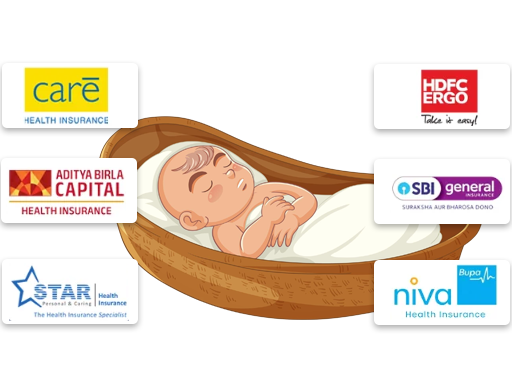- Top cancer insurance plans
- Hassle-free online purchase
- Covers major types of cancer

Simran has over 3 years of experience in content marketing, insurance, and healthcare sectors. Her motto to make health and term insurance simple for our readers has proven to make insurance lingos simple and easy to understand by our readers.
Reviewed By:

Anchita has over 6 years of experience in content marketing, insurance, and healthcare sectors. Her motto to make health and term insurance simple for our readers has proven to make insurance lingos simple and easy to understand by our readers.
Updated on Aug 12, 2024 3 min read




Best Cancer Insurance Plan in India 2025
Cancer Insurance Plans are crucial for those who have been diagnosed with cancer or have a family history of cancer. Health Insurance for Cancer Patients provides coverage for all cancer stages as well as the added benefit of a lump-sum payment in addition to income in the event of a serious cancer diagnosis. A cancer insurance policy covers cancer treatments such as hospitalization, chemotherapy, radiation, surgery, and so on.
In the case of cancer detection in an individual, cancer insurance provides the insured life with a lump sum amount in order to seek the best cancer treatment. Cancer is not limited to a person, gender, geography, or demography. According to the Indian Council of Medical Research (ICMR) and the Bengaluru-based National Centre for Disease Informatics and Research states by 2025 the number of cancer cases in men may reach 7,63,575 and 8,06,218 in women.
What is a Cancer Insurance Policy?
One of the most lethal acute illnesses on the planet is also one of the most expensive. Cancer insurance is a type of health insurance that pays out a lump sum if cancer is discovered. A cancer health insurance plan will provide the insured life with a high cover amount at an affordable cost, as well as a premium waiver benefit if you are diagnosed with cancer while the policy is still in effect. Cancer health insurance is a long-term policy and can give you cover for up to 40 years. The standard eligibility criteria is mentioned below
| Entry Age | Adult Entry Age | Claim Settlement | Sum Assured | No-claim bonus | Tax Benefits |
| Minimum Entry Age: 18 years | Maximum Entry Age: 65 years | Cashless Claim Settlement | INR 5 l | 10 L | 15 L | 20 L | 50 L | 1 Cr | 2 Cr | Available | Available |
Difference Between Cancer and Critical Illness Health Insurance Plans
There are various differences between cancer health insurance and a critical health insurance plan. We have listed below the differentiating factors
| Differentiators | Cancer Insurance | Critical Illness |
| What does it mean? | A cancer insurance plan provides lump sum amount based on the diagnosis of various forms of cancer | A critical illness health insurance offers a claim amount on the diagnosis of listed critical illnesses in the plan |
| What is covered? | Different types of cancer | Various critical illnesses listed according to the plan selected |
| Cancer Stages | All cancer stages are covered | Standard plans cover only advanced stages of cancer |
| Policy Term | Up to 40 Years | Up to 50 Years |
Benefits of Cancer Insurance Plans
There are various benefits for individuals who invest in cancer health insurance. Individuals who have a family history of cancer patients should invest in good cancer health insurance as it will act as a safety net in case they are diagnosed with cancer in their lifetime. We all are aware of how expensive cancer is to treat across the globe which is why it is a smart decision to invest in cancer health insurance. Health insurance for cancer patients can play a vital role in safeguarding their savings and helping them with hospital bills, chemotherapy, doctor bills and more. There are various benefits of investing in a suitable cancer health insurance
- Health insurance for cancer patients will cover all the stages of cancer and not just an early stage. With the right cancer health insurance holders can be stress-free regarding their coverage against cancer regardless of what stage of cancer it is.
- Insurance holders are paid a lump sum amount on the diagnosis of listed cancer types in a policy. The lump sum amount received is beneficial for insurance holders as they do not have to undergo any waiting period and can start their cancer treatment as quickly as needed.
- Multiple cancer health insurance plans offer a premium waiver feature wherein the insurance providers waive off the remaining premiums if a policyholder is diagnosed with cancer.
- Cancer Health Insurance is eligible for tax benefits under the Income Tax Act of India.
- No- claim bonuses or benefits such as an enhanced sum insured, or premium discounts are available to a certain limit in various cancer health insurance plans if the insurance holder does not make any claims.
How can I use the claim amount from this cancer insurance plan?
Starting with the basics of cancer insurance plans, their minimum entry age is 18 years and the maximum age is 65 years, and the renewability of the policy after 65 years of age varies from policy to policy. Some of the common forms of cancer covered by such insurance plans include breast cancer, ovary cancer, lung cancer, stomach cancer, hypopharynx cancer, and prostate cancer. But usually, skin cancer is not covered.
The cancer-specific insurances are highly beneficial as they come with higher sum insured ranging from INR 10-50 lakhs that are sufficient to undertake the expensive treatments. It includes cancer diagnosis and treatment such as hospitalization, radiation, chemotherapy, and surgery, to name a few.
These plans take care of early and advanced stages of treatment which saves the patients and their families from the financial and mental pressure. Since the cancer disease is defined based on severity, a certain percentage of the policy sum assured is paid in a lump sum depending upon the terms & conditions laid in a policy. Usually, to pay the cancer benefit, the disease is divided into different stages of severity. The insurance payout depends on the stage of cancer and claims previously admitted under the policy. Such insurance policies also offer free regular cancer check-ups during the entire duration of the policy term.
Some cancer care plans also offer the benefit of premium waiver in certain cases. In this waiver benefit, once a claim under the major stage cancer benefit clause is approved, all future premium payments for the policy are waived off for the rest of the policy term. However, such a facility is applicable only when all due premiums have been paid and the policy is active.
Moreover, another benefit of cancer care policies is that they are affordably priced compared to other types of health plans. Also, the policyholders can avail of exemption on tax under Section 80D of the Income Tax Act. However, generally, there is no death, maturity, or surrender benefit payable under such plans.
Documents Required to Avail Cancer Insurance Claim
Insurance holders must submit the following documents in order to file a cancer insurance claim
- Proof of Identity
- Age
- Medical Reports
- Diagnostics Report
And other reports that may be needed by the insurance provider during the process of claim settlement.
Cancer Health Insurance Exclusions
The various exclusions under a cancer health insurance plan are mentioned below
- Any congenital conditions
- Any pre-existing disease
- Nuclear, biological or chemical contamination (NBC)
- Intoxication by alcohol or narcotics or voluntarily taking or using any drug, medication or sedative unless it is an "over the counter" drug, medication or sedative.
To know more about any information related to individual, family, senior citizen, critical illness, group health insurance, etc. book an appointment with our advisors today!
Consult for Personalized Insurance Advice

But how does it work?
Schedule a call with India’s number 1 trusted advisor with a 4.5+ rating on Google. We are not your average insurance agents. Our advisors are experts in their insurance knowledge and will give you the right information at the right time. The service is free of cost! Don’t worry, we won’t spam as we value your time.
Health Insurer Network Hospitals
Best Cancer Insurance Plans: FAQs
1. Why do I need a cancer specific insurance?
Cancer Health Insurance plans protect your family from the adverse effects that this diseases can cause emotionally, physically and financially. If you have family history of cancer, or you feel that you do not have adequate savings to pay large medical bills then it is a wise choice to buy a cancer specific policy.
2. Am I eligible to buy a cancer plan after being diagnosed with cancer?
No, it is nearly impossible to find an insurance policy that will cover someone who has already been diagnosed with cancer. However, you can add critical illness coverage to your existing health insurance plan.
3. How can I chose the best Cancer plan for myself?
To chose the best Cancer plan, it is essential for you to consider the below mentioned factors: Check the sum insured Check the policy tenure Payouts of cancer insurance at different stages of cancer Premiums Clauses of waiting and survival period
4. What is not covered under a cancer health policy?
The insurance company will not pay any benefit to the policyholder if the diagnosed cancer was due to any of the following conditions: Sexually transmitted diseases, such as HIV or AIDS Congenital conditions Intoxication by drugs or alcohol Nuclear, biological, or chemical contamination, also referred to as NBC Organ donation
5. Is radiation covered in Cancer Insurance?
Yes, the cancer plan covers the expenses associated with radiation.
6. Is chemotherapy covered by cancer insurance plans?
Yes, chemotherapy is covered by cancer insurance plans.
7. Does the cancer insurance policy nominee get any sum insured in case of the policyholder& 039;s demise?
No, most cancer plans do not offer death benefits. It would be best if you read the policy documents carefully to understand their inclusions and exclusions.
8. What are the common types of cancers covered by a cancer plan?
The mostly covered forms are breast, ovary, lung, stomach, hypopharynx, and prostate cancer.
9. Will the best cancer policy cover surgeries as well?
Yes, a cancer insurance plan will provide benefits for surgical procedures too.
10. Is domiciliary hospitalization covered in cancer insurance policies?
Yes, some insurers do provide domiciliary hospitalization in their cancer insurance policy. It depends from insurer to insurer so make sure to check this before you buy a policy.
11. What is the average cost of cancer insurance?
When purchasing a cancer policy it is essential to keep in mind the various deciding factors that affect the premium of the plan. The cover amount, features and benefits, value-added features, and more are the determining factors of cancer insurance. Insurance holders must read the policy documents carefully before purchasing a cancer insurance plan.
12. What is a survival period under cancer insurance?
The survival period under cancer insurance is defined as the time period during which the policyholder must survive after being diagnosed with cancer. Once the insurance holder surpasses the survival period the claim amount will be provided to the insured life.
Health Insurance Companies
Know More About Health Insurance Companies
Share your Valuable Feedback
4.4
Rated by 2629 customers
Was the Information Helpful?
Select Your Rating
We would like to hear from you
Let us know about your experience or any feedback that might help us serve you better in future.


Written By: Simran Saxena
Simran has over 3 years of experience in content marketing, insurance, and healthcare sectors. Her motto to make health and term insurance simple for our readers has proven to make insurance lingos simple and easy to understand by our readers.






 Reviewed By: Anchita Bhattacharyya
Reviewed By: Anchita Bhattacharyya

















Do you have any thoughts you’d like to share?